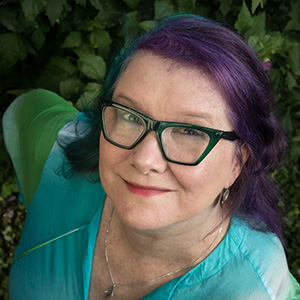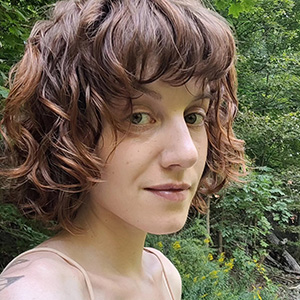Rarely Pure, Never Simple: Janice Vis interviews Tanis MacDonald

Volunteer Janice Vis talks with Tanis MacDonald, winner of 2025's Open Season Creative Nonfiction Award with her piece, “Singularity Packet,” featured in our spring issue #230. They discuss genre slippage, adult adoptees, and truths that overlap and sometimes contradict each other.
Read and excerpt from "Singularity Packet" here.
Tanis MacDonald is the author of Straggle: Adventures in Walking While Female (Wolsak and Wynn, 2022) and six other books. She teaches at Wilfrid Laurier University in Waterloo, Ontario. Her next book, Tall, Grass, Girl is forthcoming from Book*hug Press.
Read what OSCNF judge Sadiqa de Meijer had to say about her winning piece.
“Singularity Packet” is addressed to your ancestors, and so it could be described as a letter, but I can also imagine it as meditation, an essay, a journal entry, or even a kind of poem. How do you understand this piece in relation to genre? Did you always imagine this piece as a (one-way) conversation with your ancestors?
I love working with genre slippage; that opportunity to slide between received forms is one of the most attractive aspects of writing creative nonfiction.
Living as an adult who was an infant adoptee can be kind of an echo chamber, and I wanted to consider what a limited dialogue with my unknown biological ancestors could sound like. It’s a dialogue for one and is necessarily single-voiced but I also wanted to play with silence as its own stubborn position, so the piece is not quite a monologue either.
Direct address gives this piece an epistolary tone, while the aphoristic notes sprang from my search for ways to articulate the reality of living with biological mystery in a culture where biological inheritance holds the key to meaning for millions of people. I am by no means the only person living that way, but the cultural centrality of knowing-your-genetics tends to make adoptees circumspect about how and when we tell the people around us that we don’t quite glom onto that way of being in the world. I thank my lucky stars for writers like Jeanette Winterson and Jackie Kay for their books Why Be Happy When You Can be Normal? and Red Dust Road, respectively; reading them helped me develop a vocabulary for adult adoptee questions.
I’ve been feeling my way along the edges of poetry and nonfiction in recent years, challenging myself to write more argument into my lyrical prose, and more rhetoric into my poetry. I don’t think there’s a single answer to when prose becomes too poetic (and too poetic for what? for whom?) or poetry too prose-like. Like most genre transgressors, I like to run back and forth along an electrified continuum and see what possibilities I can wire up.
From the opening lines, your work is filled will elegant, unexpected, and sometimes contradictory phrases that (in my reading) hold space for multiple truths and experiences. Could you say a bit more about the theme of irreconcilability in this piece and/or your writing practises more generally? Do you think writing can help us grapple with the parts of our lives that might seem paradoxical or disjointed?
I’m always writing to figure something out; the more I try to figure it out on the page, the more those multiple truths pop up and demand my attention. I have a very busy mind, which is not always a good thing, and I find a real relief in the act of diagramming truths that overlap and sometimes contradict each other. I’m an inveterate notebook keeper and it’s gratifying to see a web of connections form over several pages, even when I think I’m taking “random” (ha!) notes. In The Importance of Being Earnest, Oscar Wilde notes, “The truth is rarely pure and never simple.” I believe Oscar.
Sadiqa de Meijer, this year’s judge, described “Singularity Packet” as “proceed[ing] organically.” There’s an almost mesmerizing fluidity about your writing, but I can’t help but wonder: where did this piece start for you? Was there a particular event, memory, or idea that served as a catalyst for the rest of the piece?
This essay made its way towards me over rough ground for a number of years in terms of my thinking, though the actual composition didn’t take nearly as long. The spark of it came from the many times I heard people I knew talking about the necessity to honour their ancestors, people from all kinds of different backgrounds, all over the planet. Every time, I would agree and attend their events and admire the beauty of their cultures and relationships and wonder “how would/could I do this?” I have a dual consciousness as a person with a vividly-remembered adoptive family and a dimly-understood birth family. I wanted to take on the challenge of writing to my ancestors, and maybe it’s no surprise that I get into an argument with them in “Singularity Packet.”
You’re an accomplished writer with multiple books and awards (congrats!). How does “Singularity Packet” relate to any of your other works?
I am currently at work on a full-length memoir that works with some of these ideas. I’m three chapters in, spurred in part by a revelatory research trip I took last year, so it feels like early days yet. My next poetry book, Tall, Grass, Girl (forthcoming from Book*hug in fall 2026) takes up some of the same concerns with adoptee consciousness. And is similarly grouchy about it.
“Singularity Packet” is written with a strong, personal voice, but you’ve also managed to engage with several other writers and artists in this piece. Are there any books or works of art that you’re currently finding inspirational or compelling?
I am a big reader and I love to bring my influences to my writing. At one point early in my career, someone remarked that it was pretentious to make so many references to other writers, which struck me as a deeply misogynist remark and I’ve been assiduously ignoring that advice ever since. Right now, I am slowing down my reading of Melissa Febos’s Girlhood because it’s so good, I never want to reach the end. Erín Moure has been an inspiration to me for all of my writing life; I was so grateful to her for blurbing my 2019 book Mobile. I read Erín’s hybrid work Theophylline: A Poetic Migration last year and can’t stop thinking about it. I fell in love with Diane Seuss’s rebellious and beautiful work with the sonnet in Frank, her Pulitzer Prize-winning book, and Henri Cole’s writing in Gravity and Center is as crystalline and complex as Yeats. (Thanks to Kirby for putting me onto Cole!) Claudia Rankine is a must-read writer for anyone who wants to think clearly about how all writing is political. I’ve been re-reading Adrienne Rich and marvelling at how timely her writing remains in these fraught times; she is a writer for the ages.

Janice Vis









